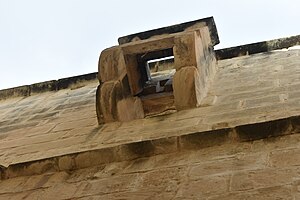Machicolations
| Machicolation | |
|---|---|
| Mâchicoulis, Piombatoio | |

A box-machicolation of the Tal-Wejter Tower, in Birkirkara, Malta
|
|
| General information | |
| Location | Europe and MENA |
| Technical details | |
| Material | Stone, sometimes wood |
A machicolation (French: mâchicoulis) is a floor opening between the supporting corbels of a battlement, through which stones or other material, such as boiling water or boiling cooking oil, could be dropped on attackers at the base of a defensive wall. A smaller version found on smaller structures is called a box-machicolation.
The word derives from the Old French word machecol, mentioned in Medieval Latin as machecollum, probably from Old French machier 'crush', 'wound' and col 'neck'. Machicolate is only recorded in the 18th century in English, but a verb machicollāre is attested in Anglo-Latin.
Both the Spanish and Portuguese words denoting this structure (matacán and mata-cães, respectively), are similarly composed from "matar canes" meaning roughly "killing dogs", the latter word being a slur referring to infidels.
In Italy and countries which were influenced by the Italian language, such as Malta, it was known as piombatoio.
Similar to a machicolation is a smaller version which opens similar to an enclosed balcony, generally from a tower rather than a larger structure. This is called a box-machicolation.
The design of a machicoulis, commonly described as a drop box, originates from the Middle-East fortifications in the Middle East, where they are usually found on defensive walls. The original Arabian design is rather small, and similar to the domestic wooden balcony known as mashrabiya.
However, different from the domestic balcony, for defense purposes the Middle-East version of the machicoulis prominently features a wide opening at the bottom. The opening allows the dropping of hot water, oil and other material intended to cause harm to the enemy below. The otherwise enclosed opening adapted from that of a closed balcony also provides cover from enemy attack while using it.
Machicolations were more common in French castles than English, where they were usually restricted to the gateway, as in the 13th-century Conwy Castle.
...
Wikipedia
